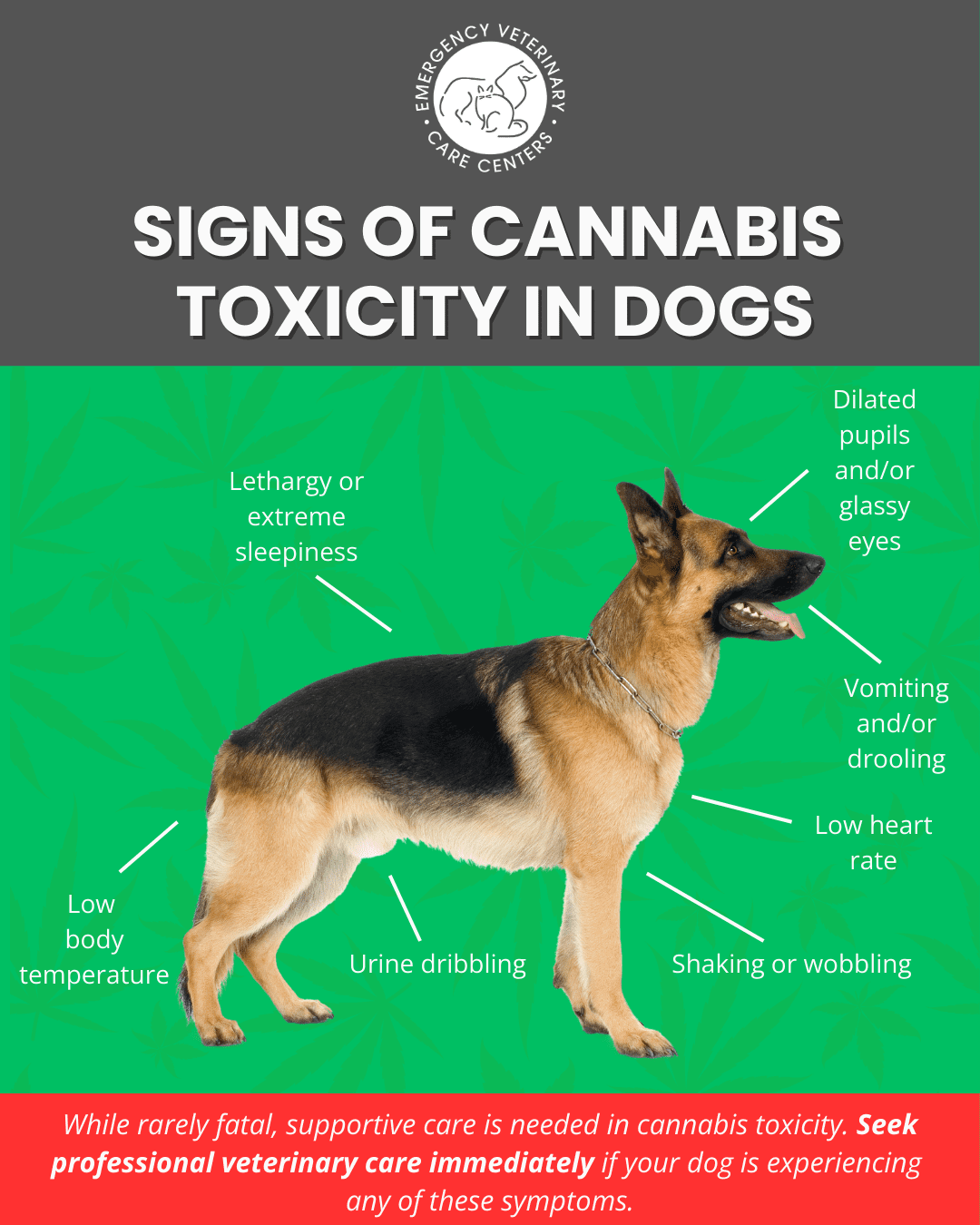
Cannabis Poisoning in Dogs: How to Treat and Prevent It
Legalization and easy access to marijuana in recent decades have led to an increasing trend of dogs ingesting cannabis products. While rarely fatal, it can bring alarming symptoms and even complications if untreated.
If you’re a dog owner, it’s essential to understand the symptoms, treatment options, and preventive measures for marijuana toxicity in dogs.
What is Marijuana Toxicity in Dogs?
Marijuana toxicity occurs when a dog ingests THC (tetrahydrocannabinol), the psychoactive component in cannabis. Since a dog’s body processes THC differently than humans, even small amounts can lead to adverse effects.
Common sources include...
- Edibles: No matter what it is, dogs are usually attracted to the scent of food. This makes cannabis-infused edibles like baked goods, candies, or butter even more enticing.
- Dried cannabis: Dogs may find and ingest dried cannabis directly, either at home or outdoors.
- Second-hand smoke: While less common, dogs can also be affected by inhaling second-hand marijuana smoke. However, it should be known that marijuana ingestion is the most frequent cause of toxicity.
Symptoms of Marijuana Toxicity in Dogs
Recognizing the symptoms early can make a significant difference. Dogs exposed to cannabis may exhibit:
- Wobbling, loss of balance, or difficulty walking unaided (e.g. Ataxia)
- Lethargy or extreme sleepiness: Many dogs will become unusually tired and stay in one spot for longer than normal periods of time.
- Urinary incontinence: Difficulty in controlling urination is a tell-tale sign.
- Overly reactive to stimuli: Known as hyperesthesia, dogs may act jumpy in response to sounds or touch.
- Vomiting: A common bodily response depending on the source and amount ingested.
- Dilated pupils or glassy eyes
- Drooling or hypersalivation
- Seizures (in extreme cases): While rare, high doses of THC can cause seizures in some dogs.

Signs are usually seen within 1-3 hours and can last 18-24 hours on average. If you spot any of the above signs, take immediate action. There are several conditions, some life-threatening, that mimic marijuana toxicity in dogs due to similar signs.
What to Do if Your Dog is High
1. Remain calm: Panicking could stress your dog further.
2. Gather information: If possible, identify the cannabis product your pet has consumed. Note the THC concentration (measured in milligrams), the type (edibles, flower, oils, etc.), and how much may have been ingested.
3. Call your primary or an emergency veterinarian: Speak with your veterinarian or contact Emergency Veterinary Care Centers (EVCC) to discuss the next steps.
We do not report ingestion incidents to the authorities, as our only concern is your pet’s health! We only ask not to hesitate to bring them in and be honest about what they may have gotten into.
You may also contact the ASPCA Animal Poison Control (APCC) Hotline at (888) 426-4435, but keep in mind that a consultation fee may apply.
4. Do NOT induce vomiting without professional advice: Certain forms of cannabis ingestion, like oils, may worsen symptoms if vomited. Always consult a vet before trying to induce vomiting yourself.
If the pet is already symptomatic, vomiting could lead to aspiration and pneumonia.
How Emergency Vets Treat Marijuana Toxicity
Veterinarians have effective ways to treat cannabis toxicity and support your pet’s recovery, such as:
- Advanced diagnostics: Bloodwork can be performed to rule out other metabolic abnormalities, since drug tests are often not accurate for pets.
- Activated charcoal: While rarely used, this can help bind the THC and limit further absorption in cases of extraordinarily large amounts of plant ingestion.
- Fluid therapy: IV fluids aid in maintaining hydration and supporting normal blood pressure.
- Monitoring and supportive care: Vets observe vital signs like heart rate, blood pressure, and body temperature while keeping your pet hydrated and comfortable.
- Intravenous lipid therapy (in severe cases): This is occasionally used to capture fat-soluble toxins like THC quickly.
- Seizure medication, oxygen support, and airway intubation in extreme cases
Dangers of Cannabis Poisoning in Dogs
Marijuana may seem relatively harmless in humans, but it poses unique dangers for dogs:
- Concentrated THC: Edibles, oils, and waxes often contain higher THC levels per gram than raw flower.
- Ingredients in edibles: Chocolate, xylitol, and high-fat content in edibles can bring additional risks. Check out why chocolate is toxic to dogs.
- Size-specific toxicity: Smaller dogs are much more susceptible to severe THC effects than larger breeds.
- Delayed reactions: Cannabis can take longer to impact dogs, making early detection more challenging.
How to Prevent Cannabis Exposure
- Keep cannabis out of reach: Treat edibles, flower, and oils as you would medications—up high and stored safely.
- Store items in airtight containers: Dogs have an exceptional sense of smell and are adept at accessing food-based items, making sealed containers essential.
- Alert guests: Your visitors should know to never leave cannabis products within reach of pets.
- Dispose of waste properly: Ensure cannabis-related waste, such as ash, is thrown away in garbage cans your dogs can’t access.
Documents to Bring to Your Vet
Should your dog ingest cannabis, being prepared can speed up care and improve outcomes. Share as many details as possible with the treating veterinarian, such as:
- The product ingested (e.g., brownie, gummy, oils)
- Dosage details: Include THC concentration labeled on packaging.
- Estimated quantity consumed
- Timing (how long-ago ingestion occurred).
When Time is of the Essence, EVCC is Here
While the thought of marijuana poisoning is stressful, quick action and consultation with professionals can lead to full recovery. If your dog is experiencing marijuana toxicity symptoms, regardless of if you have marijuana products or not in your house, do not wait.
We do not report ingestion incidents to authorities. Our only concern is your pet’s health, so please don’t hesitate to bring them in and be honest about what they may have gotten into. The more we know, the better we can help!
Share this blog with your fellow dog owners and know about the emergency care options near you. If you have any questions about your dog’s condition, call your closest Emergency Veterinary Care Center (EVCC) for guidance. We’re here to help, even on holidays and weekends.
Recent Posts
About Us
At Emergency Veterinary Care Centers (EVCC), we know that pet emergencies are unpredictable and often stressful. That's why our team, with over 20 years of emergency and critical care experience, is ready to assist you and your pet in the toughest situations.


